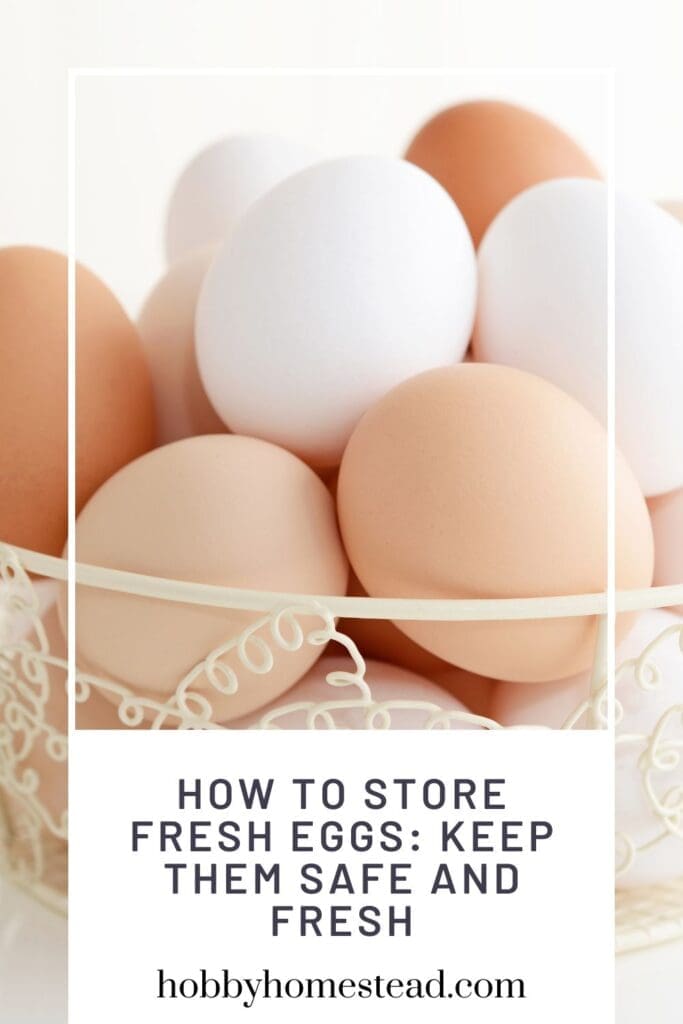Last updated on November 16th, 2024 at 08:53 am
Store fresh eggs safely and maintain their quality and flavor. Knowing the best practices for fresh egg storage can help extend their shelf life and ensure you’re getting the most out of every single one.
Whether you have your own backyard chickens, shop at the local farmers market, or buy eggs from the grocery store, know your food safety.
Safely Store Fresh Eggs Quick Overview
Freshly laid eggs from your backyard chickens are stored quite differently from grocery store eggs. Store-bought eggs may be up to 8 weeks old by the time they reach you and typically stay fresh for about a month in the refrigerator.
Backyard eggs, however, aren’t washed and retain their natural protective coating (bloom), which makes them safe to store at room temperature for up to 3 weeks if the weather is cool. After that, consider moving them to refrigeration or using other long-term storage methods to maintain their freshness.

Table of contents
Here’s a comprehensive guide to keeping your eggs safe and fresh.
Understanding Fresh Eggs and Their Protective Coating
When chickens lay eggs, each egg has a natural coating, known as the protective bloom or protective layer. This coating helps to shield the egg from moisture loss and bacteria, keeping it fresh longer.
Unwashed eggs from backyard chickens or small farms retain this bloom, making them safe to store at room temperature for a few weeks if stored correctly. Commercial eggs in the United States are washed, which removes this coating and requires refrigeration for optimal safety.
How to Store Unwashed Fresh Eggs from Backyard Chickens or Local Farmers
If you have access to farm-fresh eggs from local farmers or your own backyard chickens, you may find unwashed eggs. Here’s the best way to store them:
Room Temperature Storage. If eggs are unwashed, they can be kept on the kitchen counter for up to two weeks. However, if you need longer storage, refrigeration is ideal to prevent moisture loss and extend the shelf life.
Refrigeration in the Original Carton. For extra eggs or for long-term storage, keeping unwashed eggs in the original carton in the refrigerator will help prevent the growth of bacteria and keep them safe for months.
Using an Egg Skelter. This is a great way to keep track of your eggs by rotating them. So, the oldest eggs are always used first. Place the eggs with the pointy end down to protect the air pocket and maintain freshness.
Storing Washed Eggs from the Grocery Store
Eggs from the grocery store are typically washed, so they lack the natural coating and should be kept in the refrigerator. Follow these tips to maximize freshness and safety:
Don’t Use the Refrigerator Door. Store eggs in the main section of the fridge, as the temperature in the door fluctuates more frequently.
Leave in the Original Egg Carton. This protects the egg shells and helps prevent moisture loss.
Check the Expiration Date. Most grocery store eggs are safe past their expiration date if stored properly, but a float test can help you determine if they’re still good (more on that below).

How to Test Freshness: The Egg Float Test
If you’re unsure about an egg’s freshness, the egg float test is a simple way to check.
Place the egg in a glass of water (or a quart of water). Fresh eggs sink, while older eggs with larger air pockets will begin to tilt or float.
A bad egg will likely float at the top. This test is handy for older eggs that you aren’t certain about.
If you own chickens, this is a simple way to make sure you’re eating safe food. Growing up, we used this method often to tell if the eggs were still fresh.
Our chickens were roaming free during the day. Often, we would find a new nest of eggs somewhere. We didn’t want to waste, so we checked them for freshness. Read more about the float test on our blog.
Preserving Eggs for Long-Term Storage
For those with a surplus of eggs, here are different ways to store eggs for the long term:
Freezing Eggs. Separate the egg whites and yolks and freeze them in an ice cube tray or airtight containers. You can freeze whole eggs (without the shell) by gently whisking them before freezing. Freezing is an easy solution for extra eggs from backyard chickens.
Water Glassing. This traditional method involves submerging unwashed eggs in a water solution of calcium hydroxide (also known as lime water) to preserve them for months. Stored in a cool place, these eggs can last through the winter months.
Mineral Oil Coating. Gently coat clean, dry eggs with mineral oil to mimic their protective coating. This extends the eggs’ freshness by sealing the egg shells and preventing moisture loss.
Pickling Eggs
Pickling is a traditional way to preserve eggs for months. This method involves boiling and peeling the eggs, then immersing them in a vinegar-based brine.
Pickled eggs are typically stored in the refrigerator for maximum safety, but the acidic environment of the brine inhibits bacterial growth, allowing pickled eggs to last for several weeks or even months.
The flavor is tangy, and pickled eggs make a great snack or addition to salads.
Dehydrating Eggs
For long-term storage, dehydration is an option, though less common in home kitchens.
Dehydrated eggs involve cooking, then drying egg whites or yolks separately before grinding them into a fine powder. This powder can be stored in airtight containers in a cool, dark place and rehydrated as needed.
Dehydrated eggs can last for years when stored properly, making them a fantastic option for emergency food storage or camping.
What’s the best practice for storing eggs from a farmer’s market or small farm?
Eggs from local farmers are often unwashed and can be stored at room temperature for a few weeks. For longer storage, keep them in the refrigerator.
Should I wash my eggs before storing them?
If you plan to store dirty eggs from nesting boxes or small farms, it’s best to leave them unwashed until ready to use. Washing removes the protective bloom and allows bacteria to enter the shell. If you need to clean them, use a dry cloth or warm water just before cooking.
How can I prevent moisture loss in eggs?
Store eggs in airtight containers and keep them at a consistent temperature to minimize moisture loss and maintain quality.
Is it safe to store raw eggs at room temperature?
In the United States, storing washed raw eggs at room temperature is not recommended. However, unwashed fresh eggs with their natural coating intact are safe at room temperature for a limited time.
Storing Eggs Large End Up
One lesser-known tip for prolonging egg freshness is to store them with the large end up. The air pocket is located at this end. Keeping it at the top helps stabilize the egg and prevents the yolk from shifting too much, which can impact quality over time. This positioning can reduce the rate of moisture loss and ensure your eggs stay fresh for longer.

Optimal Storage Temperature for Maximum Freshness
For the longest possible shelf life, keep eggs at a stable temperature of 35-40°F. This range is ideal, as it’s cool enough to slow bacterial growth without causing the eggs to freeze.
For anyone storing extra eggs in a secondary refrigerator or a cool area of the pantry, maintaining this temperature can make a significant difference. Remember, temperature fluctuations can compromise quality, so it’s best to store eggs away from areas where the temperature might vary, like the refrigerator door.
Why European Countries Store Eggs at Room Temperature
In the United States, eggs are typically washed, which removes their protective coating and requires refrigeration. However, in European countries, eggs aren’t washed before sale, so they retain their natural coating, also known as the protective bloom.
This layer allows them to be stored safely at room temperature without the risk of bacteria entering through the shell. For those who prefer farm-fresh eggs from a local farm or farmers market, this cultural difference is a helpful point when deciding how to store eggs at home.
What to Do if an Egg Cracks During Storage
Occasionally, eggs may crack while being stored. If you notice a cracked egg, it’s best to use it as soon as possible to reduce the risk of contamination.
Cracks in the shell allow bacteria to enter, which can make the egg unsafe over time. If you spot a cracked egg, consider cooking it right away or storing it separately in an airtight container in the refrigerator to prevent it from contaminating the other eggs.
Seasonal Changes and Egg Storage
If you raise backyard chickens, you may notice that egg production decreases during the winter months due to lower daylight hours. To avoid running out of eggs when production slows, consider preserving eggs during peak laying seasons.
Water glassing or freezing whole eggs, egg whites, or egg yolks can keep a supply of delicious eggs on hand even when your hens lay fewer eggs. This seasonal approach can be a great way to ensure you’re never short on fresh eggs, regardless of the time of year.
Storing Fresh Eggs: A Summary
Whether you have backyard chickens or get your eggs from the farmers market, storing them correctly ensures you enjoy delicious, fresh eggs for as long as possible.
Knowing how to store eggs, from room temperature eggs to long-term preservation techniques, is a skill every home cook should have.
Follow these tips, and you’ll always have delicious eggs on hand for your favorite dishes.
References
Chickens and More. How To Correctly Store Fresh Eggs: The Complete Guide.
Purina Mills. How Long Do Eggs Last? Facts About Farm Fresh Eggs.
University of Minnesota Extension. Safety tips for handling farm fresh eggs.


